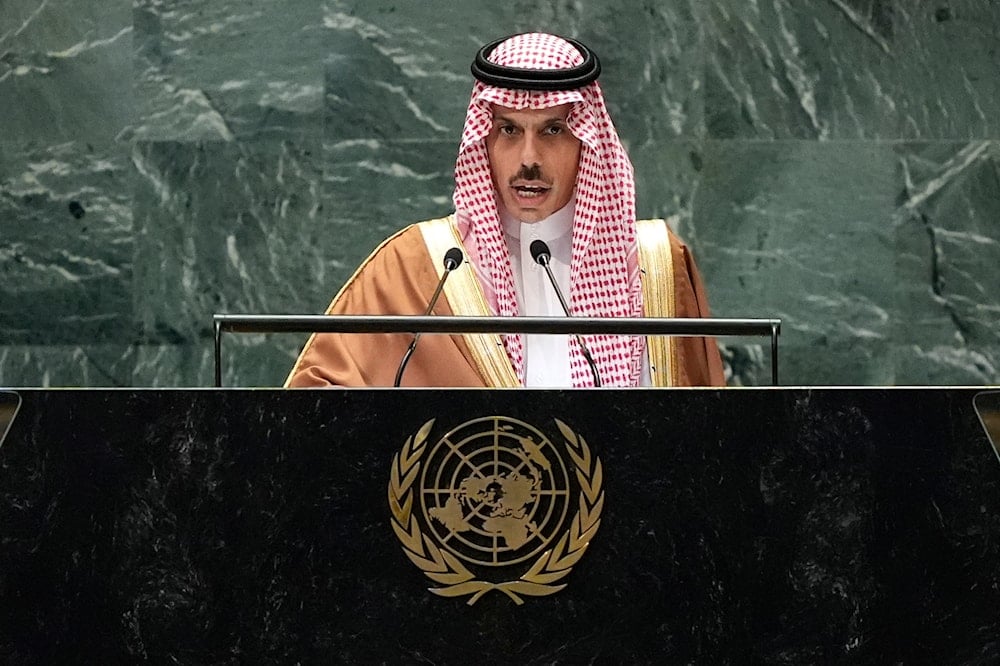Saudi Arabia condemns Gaza famine as failure to deter 'Israel'
Saudi Arabia denounces the Gaza famine as a result of the international community’s failure to deter "Israel’s" crimes.
-

Saudi Arabia's Minister for Foreign Affairs Prince Faisal bin Farhan Al-Saud addresses the 79th session of the United Nations General Assembly, Saturday, Sept. 28, 2024. (AP Photo/Pamela Smith)
The Kingdom of Saudi Arabia has expressed deep concern over the official declaration of famine in Gaza, describing it as the direct result of the international community’s failure to deter "Israel’s" war crimes.
In a statement on Friday, the Ministry of Foreign Affairs stressed that the worsening humanitarian catastrophe in Gaza “will remain a stain on the international community.”
#Statement | The Foreign Ministry expresses the Kingdom of Saudi Arabia's deep concern in light of the Integrated Food Security Phase Classification (IPC) report and the official declaration of famine in the Gaza Strip. It also condemns the genocidal crimes committed by the… pic.twitter.com/R6aaRg7OKO
— Foreign Ministry 🇸🇦 (@KSAmofaEN) August 22, 2025
“The Kingdom affirms that the worsening humanitarian catastrophe in Gaza is a direct result of the absence of deterrence and accountability mechanisms for the repeated crimes committed by the Israeli occupation,” the statement read.
Riyadh urged the UN Security Council to intervene immediately “to end the famine and stop the war of genocide and crimes committed by Israel against Palestine.”
Other Arab states echoed Saudi Arabia’s position on Gaza. Kuwait denounced what it described as "Israel’s" policy of starvation, oppression, and displacement against civilians, stressing that such actions constitute a blatant violation of international law and UN Security Council resolutions.
Similarly, the Secretary-General of the Gulf Cooperation Council (GCC), Jasem Mohamed Albudaiwi, emphasized that the famine declaration “clearly reflects the dangerous, inhumane, and illegal starvation policies pursued by the Israeli occupation forces against the Palestinian people.”
Jordan also voiced strong concern, with Foreign Ministry spokesperson Sufyan Qudah describing the famine announcement as “a dangerous indicator of the catastrophic humanitarian situation in the Gaza Strip, resulting from systematic inhumane measures by [Israel].”
Saudi Arabia’s expanding diplomatic role
Saudi Arabia has escalated its rhetoric against "Israel" in recent months, with the Foreign Ministry in August 2024 accusing "Israel" of committing “genocide” in Gaza. Riyadh has warned that such actions undermine regional security and stability.
Foreign Minister Prince Faisal bin Farhan Al-Saud also declared in July 2025 that achieving a permanent ceasefire in Gaza is the Kingdom’s top priority. He reaffirmed that normalization with "Israel" remains impossible without the establishment of an independent Palestinian state with East al-Quds as its capital.
In July 2025, Saudi Arabia co-chaired with France the UN-backed “New York Declaration on the Peaceful Settlement of the Question of Palestine,” which outlined a roadmap for a two-state solution. The Kingdom also spearheaded an international coalition in 2024 to support Palestinian statehood, bringing together representatives from 90 countries.
Saudi Arabia has further hosted Arab-Islamic summits, demanding an end to "Israel’s" aggression in Gaza and Lebanon, and has attempted to position itself as a central actor in regional diplomacy on Palestine.
Saudi-"Israel" normalization efforts
Before the war on Gaza, Saudi Arabia and "Israel" were engaged in advanced negotiations toward normalization. Building on the Abraham Accords of 2020, which established ties between "Israel" and several Arab states, Washington sought to broker what was described as a “mega-deal” between Riyadh and Tel Aviv.
By mid-2023, Saudi Crown Prince Mohammed bin Salman had publicly acknowledged that the Kingdom was moving closer to an agreement. Reports indicated that the framework of the deal included three major components. Riyadh would receive a mutual defense pact with the United States, enhanced access to American arms and security cooperation, and assistance in developing a civilian nuclear program.
In exchange, "Israel" would gain formal diplomatic recognition from Saudi Arabia, expanded regional legitimacy, and economic opportunities across the Gulf. For Washington, such a breakthrough was seen as a foreign policy milestone, strengthening regional security and countering both Iran and China.
Negotiations advanced rapidly in the months leading up to the Gaza war, with US envoys shuttling between Riyadh and Tel Aviv in early October 2023 to finalize terms. Yet, once the war erupted, momentum collapsed. Direct talks were suspended, and Riyadh hardened its position.
By late 2024, Saudi Foreign Minister Prince Faisal bin Farhan declared normalization “off the table” until there was a clear resolution on Palestinian statehood. The Kingdom has since tied any recognition of "Israel" explicitly to the establishment of an independent Palestinian state, with East Jerusalem as its capital.

 4 Min Read
4 Min Read










